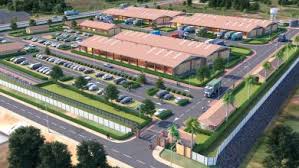The Ugandan government, in partnership with the Royal Danish Embassy Kampala (DANIDA) and the European Union Delegation under the Team Europe framework, has launched a groundbreaking USD 11.5 million (over Shs 41 billion) project to build a climate-resilient, gender-responsive cross-border market in Elegu, Amuru District.
The initiative aims to transform the market into a modern trade hub that supports sustainable commerce while addressing climate challenges and promoting social inclusion.
Located along the busy Gulu–Nimule highway, the existing market at Elegu is Uganda’s busiest informal trade link with South Sudan, handling trade goods worth an estimated USD 220 million in 2022. However, frequent flooding caused by the nearby Unyama River has disrupted operations, damaged merchandise, and triggered disease outbreaks, leading to significant losses for thousands of traders.
This project, implemented by TradeMark Africa (TMA) in collaboration with Amuru District Local Government, represents Uganda’s first climate-resilient cross-border market. It is designed to not just stimulate regional trade but also to empower women, youth, and persons with disabilities who constitute a substantial part of the trading community.
Spanning 11.45 acres, the new market facility will be elevated above flood levels and equipped with robust drainage systems to prevent flood-related disruptions. Key features include:
1,500 vendor stalls accommodating diverse traders
A grain handling unit to support agricultural commerce
A banking hall providing access to affordable loans and financial services
A daycare center to support working mothers
A restaurant and solar-powered utilities to improve sustainability and services
Accessibility features such as ramps, lowered counters, and tactile signage to assist persons with disabilities
Women make up approximately 63% of the current traders at Elegu.
The inclusion of an on-site daycare center is expected to enable longer trading hours, increasing women’s daily incomes by 15–25%. Enhanced accessibility is projected to raise participation by persons with disabilities and youth by at least 30%.
Additional infrastructure improvements include a 450-meter access road and covered loading bays that will reduce loading and unloading times, speeding up trade processes and potentially boosting annual trade revenues by an estimated USD 22 million.
Access to banking facilities directly on-site is a game-changer for traders, who often struggle with predatory moneylenders charging up to 30% interest. Affordable loans accessed through these formal channels are expected to help small businesses expand, thereby improving household incomes and fostering economic resilience.
The project is projected to benefit approximately 5,000 households by sustaining year-round trade and strengthening Uganda’s strategic position in regional commerce.
It safeguards the Elegu–Nimule corridor’s vital role as a gateway for trade between Uganda and South Sudan, supporting livelihoods for thousands of traders dependent on this cross-border route.
This initiative aligns with Uganda’s broader vision for resilient infrastructure, inclusive economic growth, and climate adaptation, setting a benchmark for future developments in the region.



